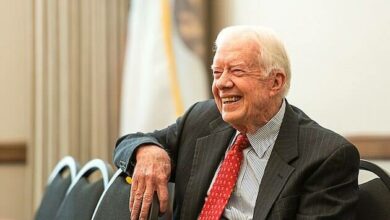All we did was survive: The state of the pro-life movement under President Trump
The pro-life movement faced a gathering storm in 2016.
In California, pro-life pregnancy centers were forced to advertise abortion services or pay crippling fines. In New York, Catholic nuns were told to fund abortion in their health-care plans or dissolve. Nationally, pro-life doctors were pressured to refer patients for abortion or risk their medical credentials. Politically, the outlook was grim. Abortion activists were one appointment away from commanding the Supreme Court. A conservative justice was dead. The Republican presidential candidate had lamentable character, and his pro-life commitment was unproven. And the candidate sworn to uphold abortion at any stage of pregnancy appeared to be running away with the election.
Then, in God’s strange providence, Donald Trump’s win stalled the abortion juggernaut. Given a choice between a flawed presidential candidate who might limit abortion and one who affirmed it wholesale, a majority of pro-life advocates voted to limit the evil and promote the good insofar as possible. Political ambition did not drive them to the polls. Survival instinct did. They feared a Clinton presidency would irrevocably crush their efforts to save children.
Pro-lifers received some immediate relief from the new president. He cut off overseas funding for abortion. He created a special office to protect the conscience rights of health-care professionals. Most importantly, he began overhauling the federal courts. Last summer, the Supreme Court tossed the California law that forced pregnancy centers to promote abortion. The decision was 5-to-4. Without Trump appointee Neil Gorsuch, that ruling goes the other way.
All this is good news for the pro-life movement, but an escape is not a triumph. Abortion is here to stay as long as millions of Christians are uninformed and unequipped, as long as those predisposed to accept our view and contend for it never actually experience pro-life teaching. Whatever gains have been made in Washington, we are failing in our churches and Christian schools. And the political cost of that failure is steep. Sustained political victory happens when large coalitions of pro-life voters command the electoral landscape to the extent that we can protect candidates who support us and penalize ones who don’t. Christian students are especially vital to building that coalition, but they’re not hearing from us. The problem is not messaging. It’s access. For many Christian leaders, the thought of pro-life teaching is dead on arrival.
Only Two Percent
Democratic National Committee Chairman Tom Perez presides over a political party dedicated to the proposition that an entire class of human beings can be set aside to be killed. For Perez, the right to abortion is absolute. “Every Democrat, like every American, should support a woman’s right to make her own choices about her body and her health. . . . That is not negotiable.” Perez blames churches for hamstringing his party’s messaging on abortion. The Sunday morning pulpit elevates abortion above everything else “and people buy it. Because that’s their only source,” the DNC chairman laments.
Anyone who thinks Perez is right should visit Summit Ministries. Each summer, Summit runs regional worldview conferences in Colorado, Tennessee, and Pennsylvania. The purpose is simple: prepare Christian students for the intellectual challenges they will face once they leave the safety of their local churches and step on to the university campus.
I teach the abortion sessions at Summit. For the last five summers, I’ve conducted an informal survey of attendees. I ask for a show of hands on a specific question: “How many of you, prior to coming to Summit, heard a pro-life apologetics presentation in your church aimed at equipping you to defend the pro-life view?” The numbers are remarkably consistent. Out of 1,800 students present each summer, an average of 45 have prior exposure to a pro-life apologetics presentation in their local churches. Let that sink in: 45 out of 1,800! That’s only 2.5%.
What Makes Pro-Life Teaching Hard?
Churches aren’t the only challenge. Life Training Institute (LTI), where I serve as President, trains Christians to make a persuasive case for life in the public square. The primary way we fulfill our mission is by making pro-life apologetics presentations in Catholic and Protestant high schools. Last year, our speaking team reached 72,000 students with pro-life apologetics talks. Unlike other pro-life presentations that focus on chastity or sexual purity (programs we fully support), LTI presentations focus exclusively on why the pro-life view is true and reasonable to believe. To my knowledge, we are the only pro-life group that systematically targets Catholic and Protestant high schools with pro-life talks of this sort.
It takes a Herculean effort and a lion’s share of our budget to get in front of 72,000 Christian students. Many schools ignore us. Why is that?
Credentials aren’t the problem. Anyone who spends five minutes on Google can see that LTI speakers engage students with persuasive content and earn favorable reviews everywhere they go. Nationally syndicated programs like Focus on the Family and Issues, Etc. feature our presentations. We’ve published books with Crossway and Hendrickson. The Gospel Coalition publishes our articles. We’re contributing authors to the Christian Research Journal. In addition to Summit, we lecture at Biola University’s worldview conferences and teach pro-life apologetics to aspiring lawyers at Alliance Defending Freedom’s Blackstone Academy. We were asked to advise a presidential candidate on abortion. Christian leaders like John Piper, J.D. Greear, Al Mohler, and John Stonestreet reference our training materials. We have secular credentials as well. I’ve debated my friend Nadine Strossen — former president of the ACLU — on several university campuses.
Messaging isn’t the problem. Students routinely thank us for making persuasive arguments instead of emotional appeals. A common response is, “That was amazing. You’re the first person to actually give us reasons.”
Speaking fees aren’t the problem. We understand that most Christian schools are broke. Thus, with few exceptions, we send our speakers for free. We pick up the airfare, hotel, car rental, and speaker stipend. We absorb the cost of hiring a full-time staffer to secure the event in the first place. The school pays nothing.
It’s still tough getting in.
What They Don’t Want to See
Put simply, our problem is subject matter. We’re offering an abortion presentation many Christian schools and churches don’t want. Our challenge is to make them want it, to convince them it’s vital to the formation of a Christian worldview, and to persuade them that students will thank them for hosting it.
Once a Christian high school agrees to have us, we face another challenge: negotiating an effective presentation. The best talks include persuasive arguments, gospel, and the careful use of abortion imagery. Gregg Cunningham puts it well: “Pro-lifers should stop protesting abortion and start exposing it. When you show pictures of abortion, abortion protests itself.” Our pro-abortion adversaries know this and candidly admit their rhetoric is no match for the visuals. “When someone holds up a model of a six-month-old fetus and a pair of surgical scissors, we say, ‘choice,’ and we lose,” writes feminist Naomi Wolf.
Nevertheless, opposition to the images is stiff, even among pro-lifers. Last year, I spoke in chapel at a large Christian university. The event host refused to let me show a 55-second clip depicting abortion as part of my presentation despite acknowledging my documented history of using visuals responsibly. He knew that I never spring disturbing pictures on unsuspecting audiences, that I fully disclose the contents of the film before showing it, and that I invite people to look away if they wish not to watch. He knew that I situated the pictures within the context of the gospel, stressing God’s grace to wounded people rather than condemnation. Nevertheless, he wouldn’t fight for the clip when his staff objected to its use. He admitted the images save lives and resonate powerfully with audiences but said students at his university were too fragile to handle them.
Event hosts say this all the time. They want other people to see the images, just not their people. They hope FOX News will do the heavy lifting for them. Ironically, that same chapel host said he was on a personal mission to recruit more students for the campus pro-life club, whose numbers were abysmally low. How? By hiding the truth from them? As Cunningham points out, “When pro-life leaders care more about the feelings of the born than they do the lives of the unborn, the pro-life movement is in real trouble.”
If you think accessing Christian schools is tough, try popular Christian conferences. Students ages 18 to 24 are most at risk for abortion, yet you would never know it by surveying the speaking lineups. You’ll find sessions on global sex trafficking, world hunger, economic justice, climate change, refugees, and racism, but there’s no passion to engage the culture on the legally sanctioned killing of 61 million innocent human beings in our own nation since 1973. At times, pro-lifers encounter outright hostility. In 2015, Urbana — once the premier evangelical student conference — featured a Black Lives Matter speaker who used her keynote slot to bash pro-lifers for “only doing activism that is comfortable” and for “withholding mercy from the living so that we might display a big spectacle of how much we want mercy to be shown to the unborn.”
Does any of this sound like an evangelical community woke to elevating abortion above everything else?
Functionally Pro-Choice?
It gets worse. The 2017 Evangelicals for Life conference, where I presented a session on pro-life apologetics, featured a keynote address from Eugene Cho, the former lead pastor of Quest Church in Seattle. Cho told pro-lifers to rewrite their job descriptions to include a comprehensive, whole-life ethic. “We can’t just be anti-abortion. We should be for the sanctity of life from the womb to tomb. . . . Not just American lives, but Syrian lives. Not just Christian liberty religious lives, but Muslim refugee lives.” We can’t cherry pick. “All life is sacred and every single human being bears the image of God.”
Except when that image-bearer isn’t sacred enough to legally protect. What conference attendees may not have known is that Cho is functionally pro-choice. He personally opposes abortion and wants to reduce it but thinks it should remain legal in a pluralistic society due to the high cost of outlawing it. He writes, “Like most Christians I know, I am against abortion. However, I just do not believe we can legislate it. . . . Can we maintain choice but do all that we can to preserve and ensure the life of an unborn?”
Has it ever occurred to Cho that a society which dramatically reduced the lynching of blacks, but left it legal to lynch them, would be a deeply immoral society? Imagine telling blacks, “We will do all we can to protect you so long as it’s not too expensive and meets with popular approval in our pluralistic society. After all, we want to maintain choice.” This is beyond mind-boggling. When a pro-choice pastor, who thinks it should be legal to intentionally dismember innocent human beings because it costs too much to protect them, uses his platform at an evangelical pro-life conference to tell abortion opponents they aren’t really pro-life, “pro-life” has lost all meaning.
Cho isn’t providing students or anyone else biblical leadership on abortion. He’s conveying what the secular culture already believes. As journalist Christopher Caldwell points out, Americans love to condemn abortion with words but keep the option legally available. “Even where Americans claim to disapprove most strongly of abortion, they booby-trap their disapproval so that it never results in the actual curtailment of abortion rights. A pro-life regime is not really something Americans want — it’s just something they feel they ought to want.”
Moreover, why is the “whole-life” argument never used against other groups who target specific forms of injustice, only pro-lifers? If an inner-city daycare ministry only receives grade-school kids from 3:00 to 5:00pm on weekdays, do we cast aspersions on them for not operating 24/7? Do we insist they spread their already scarce resources even thinner fighting poverty and gang violence? True, abortion isn’t the only issue — any more than slavery was the only issue in 1860 or killing Jews the only issue in 1940. But both were the dominant issues of their day. Pro-lifers are right to give greater weight to the greater moral issue.
My colleague Marc Newman writes, “Individuals and organizations that make it their exclusive mission to save innocent human beings from a culture hell-bent on butchering them have nothing to apologize for. They don’t need additional causes; they need additional support.”
Meanwhile, we shouldn’t assume that Christian students will get pro-life teaching from evangelical thought-leaders when some of the most influential ones consider pastoral silence a theological virtue. In 1994, Billy Graham said that addressing abortion in the pulpit could impede his “main message” of salvation. “I don’t get into these things like abortion,” Graham told talk show host Larry King.
More recently, WORLD magazine reports on an evangelical pastor in New York who says that abortion is a double-justice issue and people should be stopped from doing it, but he doesn’t focus on it from the pulpit because “pushing moral behaviors before we lift up Christ is religion” — something Jesus warns about. The biblical approach to controversial sins, he says, is to preach the gospel and let congregants arrive at the right conclusion. He cites the example of an Ivy League graduate who thanked him for not focusing on abortion from the pulpit. She added, “If I had seen any literature or reference to the ‘pro-life’ movement, I would not have stayed through the first service.” She was a lawyer, a resident of Manhattan, and an active ACLU member. Her history included three abortions. Eventually, the woman converted to Christianity under the pastor’s influence. Later she approached him to ask, “Do you think abortion is wrong?” He said yes. She replied, “I am coming to see that maybe there is something wrong with it.”
I’m glad she eventually figured it out, but what are we to conclude — that clerical silence in the face of child sacrifice is an acceptable means of evangelism? That’s cold comfort to dead children who, this pastor candidly admits, “are not being treated as they deserve.”
Prudence in the pulpit is essential, but the pastor presents a false choice. Pastors don’t have to choose between “pushing moral behaviors” or “lifting up Christ.” They can preach truthfully on abortion but do so within the context of the gospel. Large numbers of men and women attending our churches are tormented by past abortions like they are past sexual sins. Clerical silence does not spare them moralism; it spares them healing. The ghost of a dead child is sabotaging their fellowship with Christ. Instead of ignoring their sin, we should point them to the only One who can heal it. An evangelical community committed to the primacy of the gospel and its application to the sin of abortion would recognize these truths and practice them rather than bifurcate its Christian witness.
I’m thankful influential pastors like John Piper, David Platt, and Matt Chandler use their platforms to preach powerfully on abortion, but they are the exception not the rule. Joe Carter writes, “Imagine if every pastor in America had the courage to stand in the pulpit and deliver the gospel-centric message that God abhors this slaughtering of the innocent and that for the church to tolerate this sin is a fecal-colored stain on the garment of Christ’s bride. . . . The evangelical church isn’t committed as the church to rectifying this grave injustice. We never have been.”
Dunkirk, Not Normandy
While all this is profoundly disheartening, we can be thankful the pro-life movement lives to fight another day. There’s a remarkable scene in Christopher Nolan’s Dunkirk, a movie which depicts the rescue of 340,000 battle-weary and trapped British soldiers in May of 1940. As troops disembark from the hundreds of small boats sent to deliver them, a soldier remarks, “All we did is survive.” That was enough given the circumstances, but Winston Churchill was quick to say, “We must be very careful not to assign to this deliverance the attributes of a victory.” Four years would pass before those same soldiers advanced on Normandy to begin the liberation of Europe.
The 2016 election of President Trump — despite character flaws which continue to plague him — provided welcome relief to battle-weary pro-lifers. Some called his election a miracle. However, we should be quick to admit that if it was one, it was more like Dunkirk than Normandy. We were spared further defeat, but it did not signal a major advance of pro-life ideas — not when millions of students predisposed to accept our message aren’t hearing the teaching.
Pro-Life Wish List for Churches
Let’s revisit Summit: 45 out of 1,800. The responsibility for those numbers falls on local churches. The sobering reality is the pro-life movement cannot win the larger culture when it can’t access large numbers of Christian students. Consider three ways pastors can approach integrating pro-life content into student ministry.
1. USE ABORTION TALKS TO FISH FOR DISCIPLES.
Pro-life Christians don’t have to pick between defending unborn lives and being good ambassadors for Christ. We can do both.
Pro-life presentations serve an important evangelistic function. They invite unbelievers to look deeper. They plant the premise that if Christianity is true on a key moral issue, maybe it deserves a second look. An email I received about my Wayne State debate with Nadine Strossen is a case in point:
Because of your recent debate with Nadine, my sister-in-law (who is not a believer) moved from a radical pro-abortion stance to an abortion-only-in-cases-of-rape stance. A few weeks after that change, she was reading a pro-abortion article in a magazine, and as she read their arguments, your answers kept running through her head. She realized that their arguments were completely bankrupt in light of your answers. On that day, she became completely and totally against abortion for any reason. This has provided me with solid opportunities to share the gospel with her.
After my exchange with professor Malcolm Potts at U.C. Berkeley, several students from the skeptics/atheist club stuck around to chat. We sat for an hour and had a great conversation. I thanked them for considering my arguments and asked if there was anything I should do differently to better reach skeptical students. They thanked me for being a thoughtful Christian who used science and philosophy. They admitted that the reasonableness of the pro-life argument caught some of them by surprise. True, they didn’t fall on their knees and confess Christ, but they left as friends and had lots to think about.
During that entire conversation, I never once thought of myself as “pushing moral behaviors” on non-Christian students. I was fishing for disciples. Ultimately, that’s our job as Christians. Making disciples means teaching students to obey all that Christ commands (Matthew 28:19–20). One of those commands is that they are not to shed innocent blood (Exodus 23:7; Proverbs 6:16–17; Matthew 5:21). Abortion is the shedding of innocent blood, the intentional killing of an innocent human being. Therefore, abortion is a discipleship issue for the students we are trying to reach.
At Berkeley, we measure progress on the path to discipleship in inches rather than miles, but we’re fishing nevertheless.
2. PREACH AND EQUIP!
By all means, preach a biblical view of human value. But students in local churches also need to know how to make an essential pro-life argument and convey it to non-Christians. The basic shape of that argument looks like this:
Premise #1: It is wrong to intentionally kill innocent human beings.
Premise #2: Abortion intentionally kills innocent human beings.
Conclusion: Therefore, abortion is morally wrong.
Pro-life advocates defend that argument with science and philosophy. We argue from science that the unborn are distinct, living, and whole human beings. You didn’t come from an embryo; you once were an embryo. We argue from philosophy that there is no relevant difference between you the embryoand you the adult that justifies killing you at that earlier stage of development. Differences of size, level of development, environment, and degree of dependency are not good reasons for saying you could be killed then but not now.
Instead of arguing at a fever pitch, Christian students can be taught to ask thoughtful questions aimed at giving people something to think about. Two of my favorites are, “Do you believe that each and every human being has an equal right to life, or do only some have it based on something none of us share equally?” and, “If it’s wrong to hurt people because of skin color or gender, why is it okay to hurt them because they are smaller, less developed, or in a different location?” The goal of asking is not dominance but thoughtful engagement.
Christian students who make these arguments aren’t imposing their views any more than abolitionist Christians were imposing theirs or the Reverend King was imposing his. Rather, they’re proposing them in hopes that they can persuade their fellow citizens to vote them into law. That’s how a constitutional republic like ours works.
3. DON’T WATER DOWN WHAT IT MEANS TO BE “PRO-LIFE.”
One well-meaning pro-life organization insists the pro-life movement must not only save children but “programmatically” help others “build strong families, have healthy marriages, be better parents, and have thriving faith lives” — that, and promote responsible fatherhood.
Pro-lifers just got saddled with a backbreaking job description no single cause can pull off. True, as Christians we will care about many issues, but it doesn’t follow that the operational objectives of the pro-life movement must be broad as well. We do not establish “pro-life” credentials by diverting scarce resources from the unborn to take on issues that Christians with larger platforms and better funding are more than willing to address. That will kill the pro-life movement.
My friend John Ensor writes that to be ‘pro-life’ means “to speak up on behalf of children being led to the slaughter, and to engage in the rescue of those children, and their parents, who are often victims of the big abortion lie. It doesn’t mean that, as Christians, we don’t care about other issues. It doesn’t mean we don’t try to help our neighbors when they are in trouble. But it does mean we will not dilute our organizational resources chasing after every conceivable extension of life, particularly when many of those other issues already have personnel and resources that dwarf those of dedicated pro-life organizations.”
Pro-life students stand alone in their calling to save children. We need to help them fulfill it. We need to teach them how to stand well.
- Scott Klusendorf, president of Life Training Institute, for desiringgod.org






